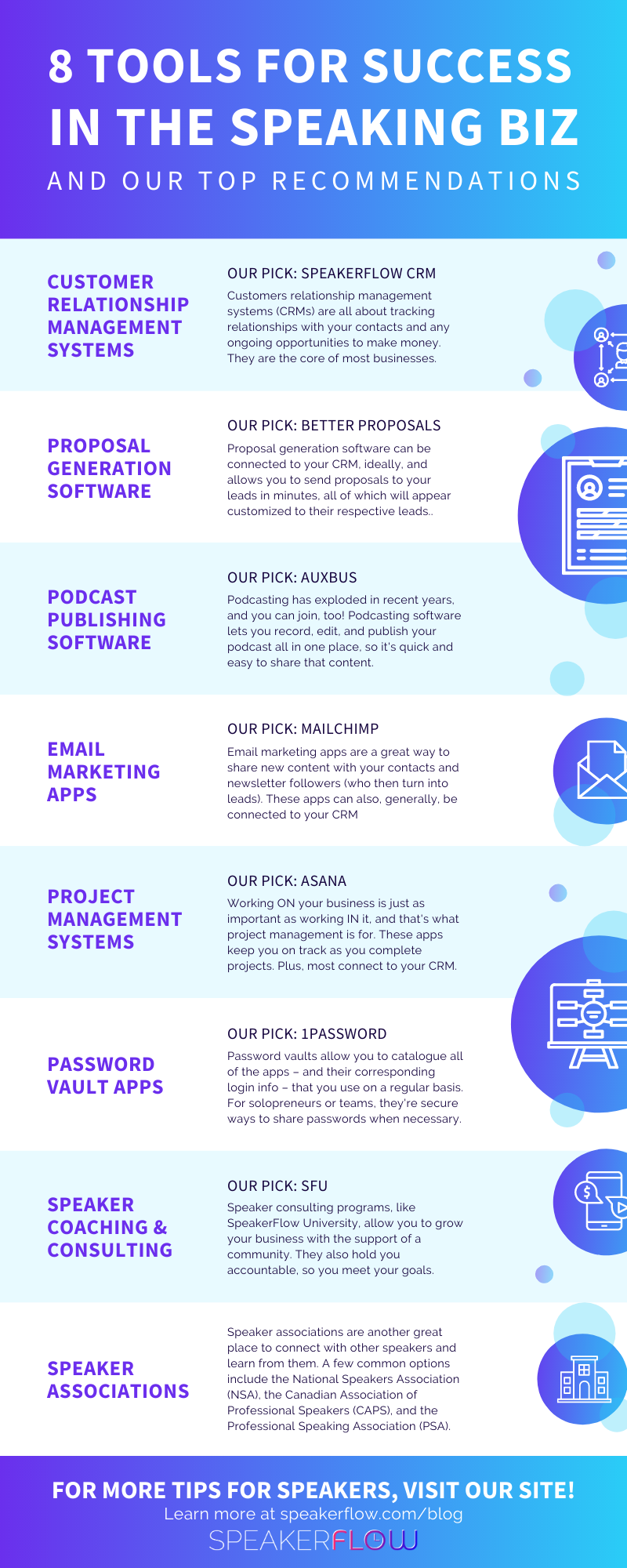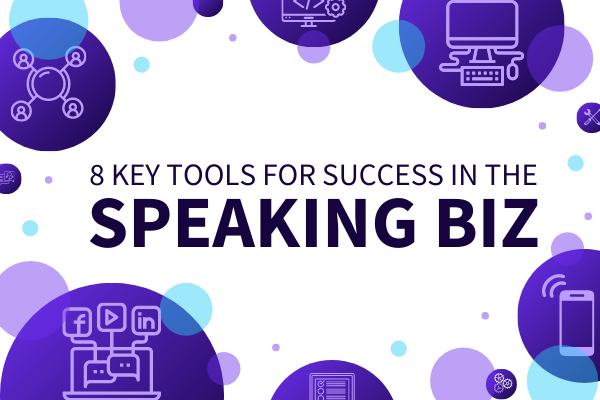When our team came together to launch SpeakerFlow in 2019, we were all about three things: technology, strategy, and community. In other words, while we didn’t just want to help speakers in one aspect of their professional life. We wanted to connect them to other participants, profitable processes, and proven systems of the speaking biz.
With that in mind, this guide is about the “best of the best.” In our combined decades of experience, we’ve tested hundreds of apps, systems, and strategies for running a successful business. More importantly, however, we’ve also been able to narrow down those options to which are the most worth pursuing.
Here, we’ll break down eight of these “tools” for speaking business success, including two each in the areas of sales, marketing, and operations, and two that are non-technical. That way, you can scale your speaking career to seven figures without breaking the bank (and without wasting any time or money testing the many tools out there). 👍
Speaking Biz Sales Tools
The first area of the speaking biz we’ll touch on is sales. Like any small business, sales as a professional speaker is largely about forming relationships. This includes looking for – and solidifying – new relationships with potential clients as well as maintaining relationships with event planners you’ve served in the past.
It also includes providing value and convenience for those relationships. To put it simply, the long term question really comes down to, “How can we make each others’ professional lives more profitable and fulfilling?” It’s about maintaining a relationship but, in doing so, serving each other so you both meet your goals.
In striving to meet both of these objectives – build relationships and serve the people in them – it’s obviously going to get harder and harder as you make more and more connections. That’s where sales technology comes in!
Obviously, there are countless sales tools out there and, depending on who you ask, some may be deemed more important than others. In our experience, two of the most-mentioned are your customer relationship management system, or CRM, and your proposal generation software. Below, we’ll break down both in more detail.
Customer Relationship Management Systems
A customer relationship management system, or CRM, is designed to help you manage all of the relevant information about your leads and clients and their organizations. In the speaking industry specifically, this includes leads, event planners, other speakers – you name it. It also includes information about all of your pending, upcoming, and past events.
By keeping all of this information in one place, a CRM gives you a central hub for your business. In fact, of the other tools in this list, most will integrate with your CRM, allowing you to manage the bulk of your sales, marketing, and operations processes all in a single app. Consequently, choosing the right CRM is essential if you want your business to run as smoothly and efficiently as possible in the coming months.
Our Recommendation: SpeakerFlow CRM
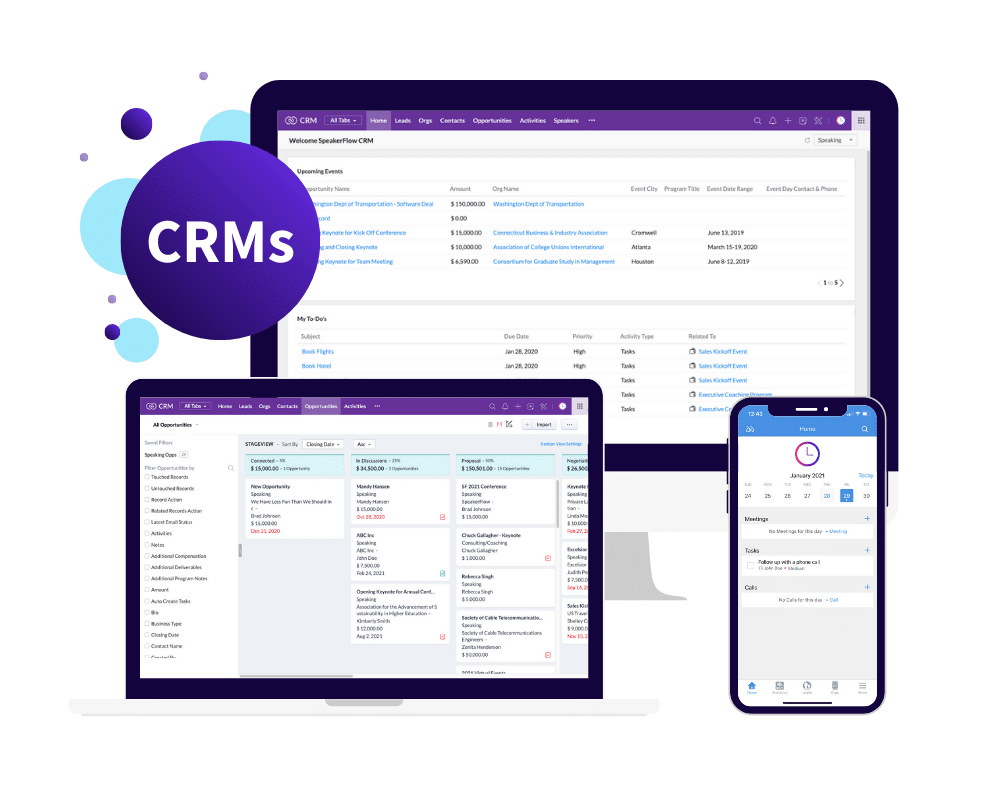
Launched in 2019, SpeakerFlow CRM was created by our team with speaker and innovation expert Julie Holmes. As a speaker herself, Julie combined her knowledge of the speaker sales experience with our team’s industry and CRM-selling experience. The resulting system was an extensively customized, top-of-the-line tool specifically for speakers. Below are a few of the many reasons we love it so much.
- Customizations: It’s the only CRM on the market built by speakers for speakers.
- Relevancy: It’s updated constantly, from small tweaks to large-scale revisions. In other words, we don’t settle, and we don’t think you should have to either.
- Stability: It’s built on top of Zoho One, making it exceptionally secure. This also means that, as a user, you have access to Zoho support as well as our team.
- Additional Apps: As a part of the Zoho One suite, all SpeakerFlow CRM users also get access to 40+ additional apps for running their business. These include apps for file storage, digital signatures, and email marketing, just to name a few.
- Price: Although there’s an initial fee for the template and onboarding, SpeakerFlow CRM (and the adjoining apps) costs $45/month. For the number of apps available on top of the CRM, that’s an unbeatable value.
Proposal Generation Software
While your CRM is about managing all of your contacts, proposal generation software is mainly for potential clients. Even if they’ve worked with you in the past, these clients are the ones that are considering whether or not to hire you for their event. In order to show them you’re a good fit, part of your job is making the booking process as convenient and professional as you can. As you’ve probably guessed, that includes your proposal.
Proposal generation software itself, however, is designed with you and your recipient in mind. On your end, it allows you to create professionally branded proposals in a matter of minutes, even if you’ve never written one before and don’t have a ton of extra time to spend writing it. Conversely, on your potential client’s end, the proposal will appear tailored to them and dressed to the nines. In other words, it’ll make you look like you really know your sh*t while also saving you a ton of time and energy. Sounds like the dream, right?
Our Recommendation: Better Proposals
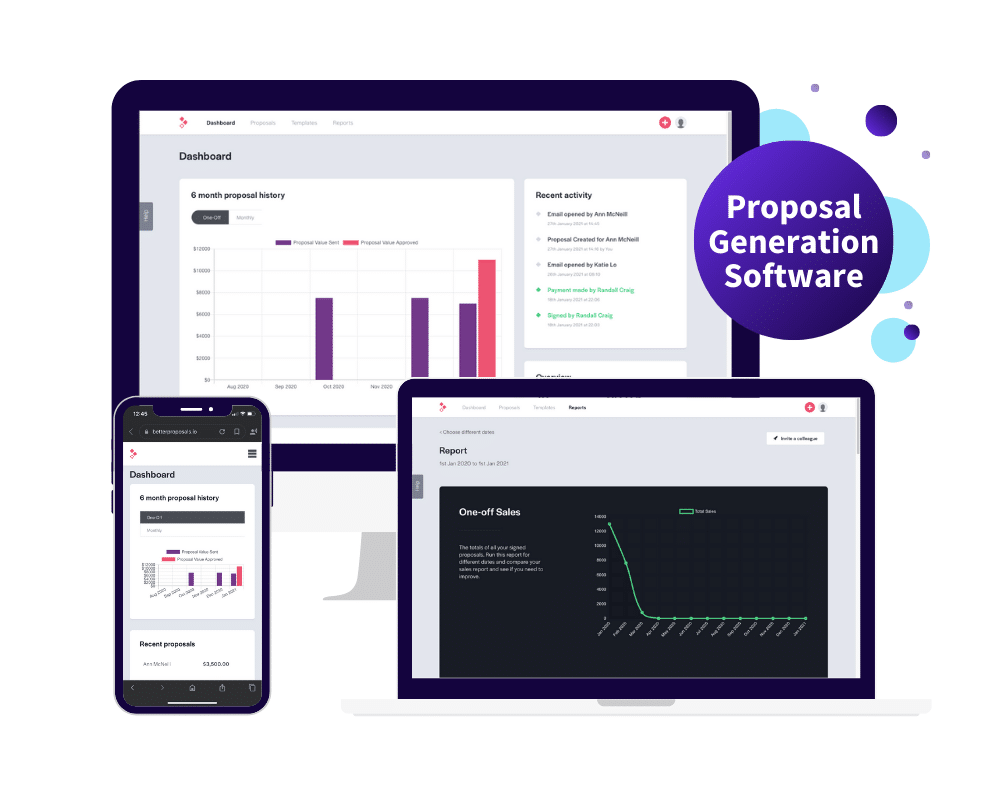
Created by entrepreneur and web designer Adam Hempenstall, Better Proposals has been our preferred proposal generation software from Day 1 for several reasons. For one thing, their team is small, remote, and super dedicated (like us!), so we were glad to find a kindred spirit in the tech space. Additionally, Better Proposals is remarkably easy to use and, despite their feature set, affordable even for new speakers. Below are more of our “favorite things.”
- Templates: It comes with hundreds of pre-designed templates. That way, you can spend less time worrying that your proposal looks good and more time closing deals.
- Custom Branding: Your entire account can be customized to match your brand. Your proposal recipients won’t be able to tell you used a template or a third-party application.
- In-App Payments: Recipients can accept your proposal and pay your deposit (or any additional fees) right through the Better Proposals app in minutes.
- CRM Integration: It connects to your CRM, so you can see which contacts have received a proposal. You can also see whether or not they opened or accepted your proposal.
- Automation: The entire proposal process can be automated, from tracking whether it’s been opened to sending a “Thank You” message once it’s been accepted. The Better Proposals app also integrates with Zapier for additional, more complex automation with your other tools.
Speaking Biz Marketing Tools
The second important speaking biz segment is marketing. Like sales, marketing is a wide-reaching topic and includes many different processes. Among speakers, some of the most common components of a marketing strategy are email marketing, website management, and content creation. However, the term “marketing” can also refer to a long list of other actions such as SEO optimization, paid advertising, and social media strategy.
Because of this variety, the number of tools branded as “marketing tools” is enormous and ever increasing. For each of the aforementioned categories, in fact, there are dozens if not hundreds of options for you and other speakers to choose from.
Take email marketing apps, for example. If you’ve spoken with a member of our team in the past, you already know we’re huge fans of Mailchimp and Zoho Campaigns. But, admittedly, there are loads of others that pop up with a simple Google search. Some of the most well-known alternatives are Drip, SendInBlue, Constant Contacts, AWeber, and Active Campaign.
Besides email marketing software, the same breadth of options exists, making it harder than ever to answer, “Which one’s right for me?” Here, we’ll take a look at two important components of marketing – podcasting and email marketing specifically – to share a few of our recommendations.
Podcast Publishing Software
Although podcasting was first introduced in 2003, it wasn’t until relatively recently that the speaking industry has been inundated with podcasting programs. For speakers, specifically, there’s The Speaker Lab Podcast and our own, Technically Speaking, among others. And for other industries – large and small – there’s hundreds of thousands, waiting for listeners.
Regardless of your focus industry(ies) as a speaker, the same potential for listeners exists. Through your own podcast, you can not only share your own insights and recommendations. You can also interview other industry professionals, solidifying your position as an industry expert and further supporting your listeners. It’s a win for you, your guests, and your listeners, so why not give it a try?
Our Recommendation: Libsyn Studio
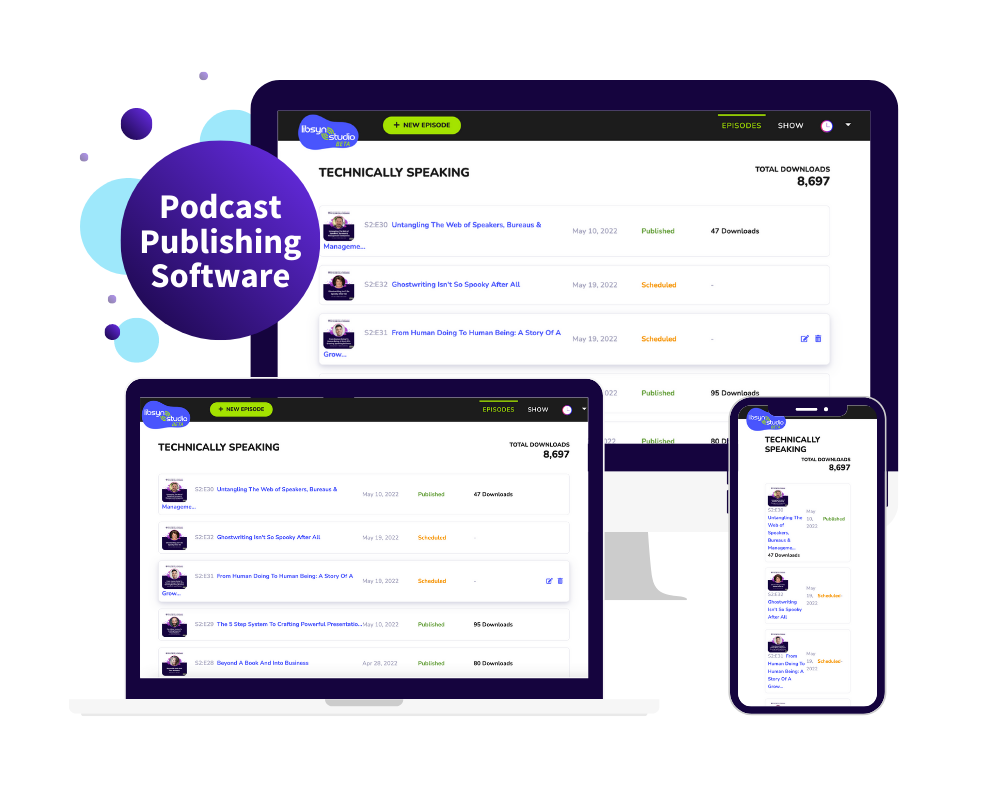
Founded as “Auxbus” in 2018 by entrepreneur and self-proclaimed audio nerd Dan Radin, Libsyn Studio is one of the newest tools in this list and one of the easiest podcast editing and publishing tools we’ve come across in our own search. With an easy-to-use interface, the entire app supports you from outlining your episode to making it live. Plus, whether you’re a newbie or a podcasting pro, you’ll be right at home in the Libsyn Studio app. Below are five additional reasons we’re such big fans.
- Audio Mastering: When recording in Libsyn Studio, your audio is automatically adjusted using artificial intelligence, so you come through loud and clear every time.
- Episode Outlines: If you’re new to podcasting, Libsyn Studio episode outline collection is for you. It’s full of ideas and scripts for unique podcast episodes. That way, you can sound experienced and confident even if it’s your first episode.
- Automatic Branding: The Libsyn Studio app automatically adds your intro and outro as you edit an episode. It also stores your podcast cover art and other braiding materials for reuse.
- Music Library: Finding royalty free music can be tough, so Libsyn Studio’s music library aims to make it simple. There, you can choose from a wide variety of great music, free from the licensing fees.
- Automatic Publication: Done with your episode? Libsyn Studio lets you share it everywhere in one click, including Apple Podcasts, Google, Stitcher, and Spotify.
Email Marketing Apps
At its core, marketing is about getting the word out there about you and your speaking business. What are you actively working on right now? Do you have any big changes or announcements to make? Have you released any new resources or content for your followers and potential leads?
Each of these questions can be answered through regular email marketing. Yet, for many speakers, starting an email marketing campaign is tedious not because of the content. It’s hard because of the time and energy it takes to write one that looks good and reads well.
Thankfully, email marketing apps can solve both of these problems. As most come with suggestions or examples, you can easily see how other users are structuring their emails (and steal the best tactics). Then, after sending them to your audience, you can collect your own data and learn what your audience reads most. All you have to do is be sure to choose a high-quality app, and you’ll be on your way to a long list of followers and fans in no time.
Our Recommendation: Mailchimp or Zoho Campaigns
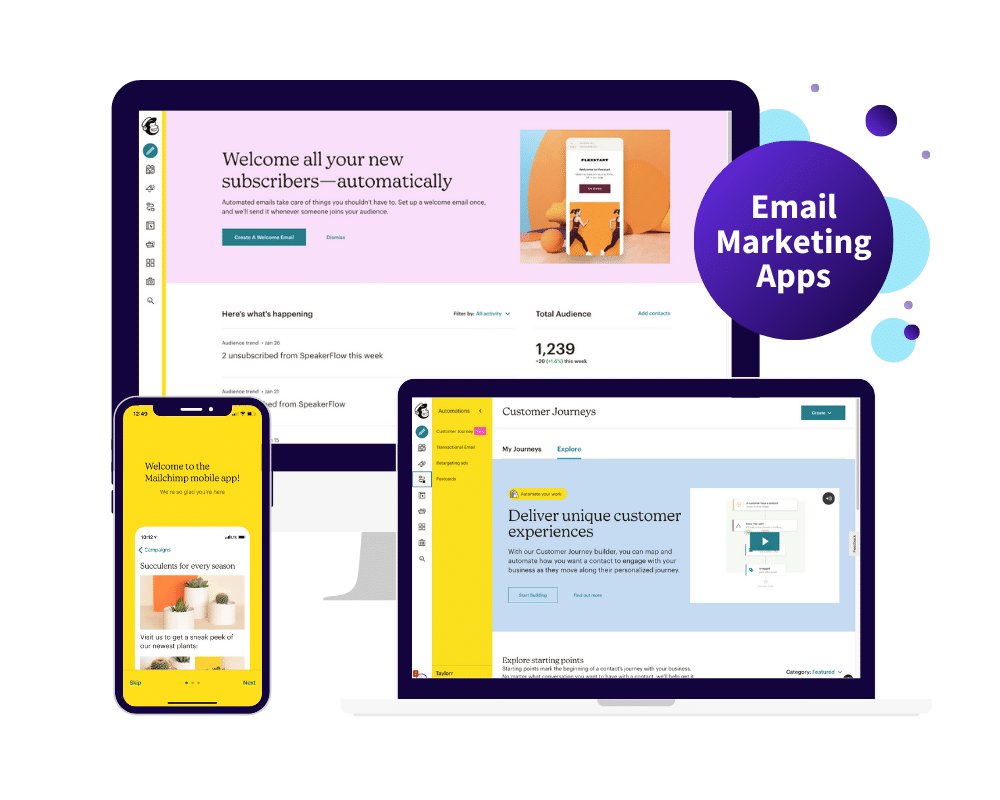
When managing your email list, we generally recommend one of two options, depending on the CRM you use. If you’re a SpeakerFlow CRM user, you automatically have access to Zoho Campaigns as part of your CRM subscription. On the other hand, if you’re not a SpeakerFlow CRM user, you can access the same amazing features through Mailchimp (our other favorite). Below are the best features of both platforms.
- Templates: Both Mailchimp and Zoho Campaigns come with professionally designed templates. That way, you can craft a content-rich, beautifully-branded newsletter in no time.
- Ease of Use: From building emails to managing active email campaigns, both apps are designed to make email marketing convenient and approachable for an affordable price. Win, win!
- Analytics: The better you know your audience, the better you can serve them. Both app’s analytics help you gain those insights so you can continue sharing the best content with your audience (and stay out of their “spam” folder).
- CRM Integration: Both Mailchimp and Zoho Campaigns integrate with your CRM, allowing you to track who’s in your email list that may also be a potential client.
- Easy Automation: Both apps also integrate with Zapier to connect with your other tools and systems. They also each have their own internal automation for simple mechanisms.
Speaking Biz Operations Tools
The third area of the speaking biz we’ll cover is operations. As you might expect, the term “operations” refers to all of the day-to-day processes and tasks of your speaking business. This includes managing ongoing projects, keeping your finances in order, and organizing your files and speaking collateral. Basically, if it’s necessary to make your business run smoothly, it’s grouped under “operations.”
Because these tasks tend to filter into your sales and marketing efforts, ensuring your operations are in order is of the utmost importance. Ignoring problems in your operating processes is essentially like ignoring cracks in the foundation of your home. Sure, you might be able to forget about it for a while. But, ultimately, the problem is only going to get worse, and it’s going to negatively affect everything it touches.
To avoid this in your speaking business, there are two areas of operations to perfect. First is the strategy behind them, and second is the technology, the tools that make executing your strategy easier and more efficient.
Here, we’ll break down two of the operations tools on which our team absolutely depends. Although there are many others, the following – a project management system and a password vault app – are the two we use the most. 👌
Project Management Systems
Among most entrepreneurs, although each has their own tricks, most will agree that you can never be too organized. From managing your ongoing sales to tackling your daily workload, organization is key to making your life easier and making your business more profitable in the long run. Part of that organizational system, for most entrepreneurs is a project management system.
Similarly to a CRM, these apps allow you to track all of your ongoing projects in a single location. However, unlike a CRM, project management isn’t about making sales or managing relationships. It’s about staying on track for your own internal goals and keeping track of all the ways you’re working on your speaking business. This includes your team’s monthly, quarterly, or yearly business goals and the corresponding tasks needed to meet them. It also includes any non-sales related efforts, such as your content calendar, podcasting schedule, or any projects “in the works.”
Our Recommendation: Asana
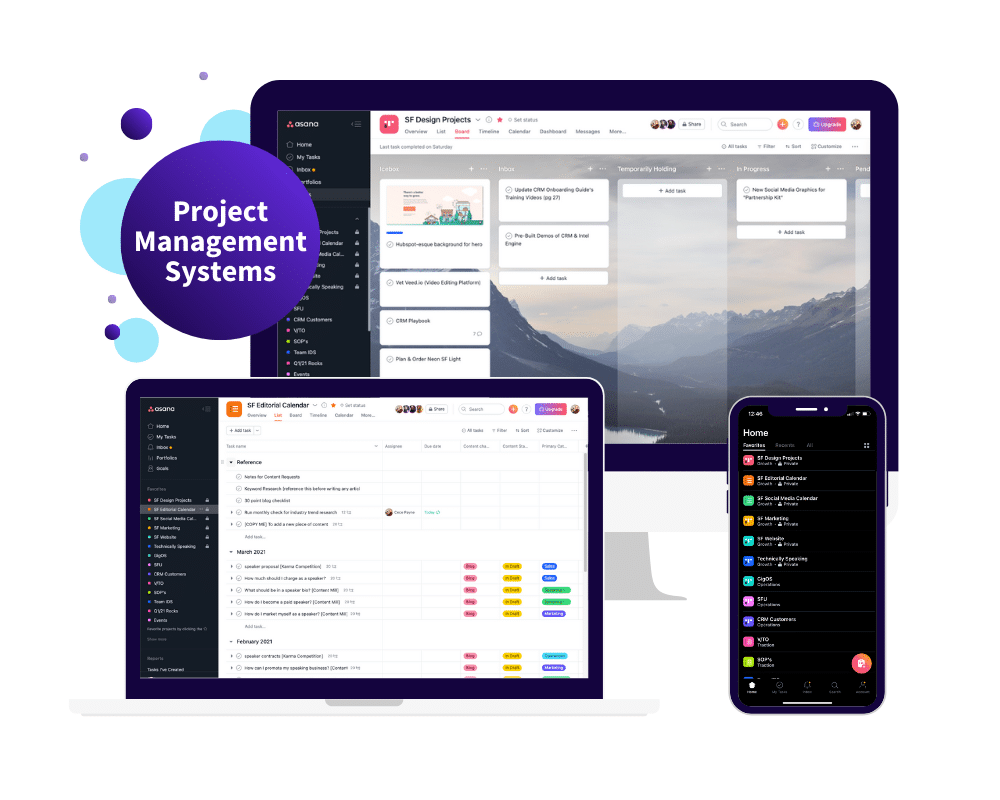
Within our own team, our tried and true project management system is Asana. Created in 2008 by Dustin Moskovitz and Justin Rosenstein, Asana is, in their words, about “building a place where everything from the most immediate details to the big picture are organized” so that teams can “collaborate with less friction and produce great results.” We’ve certainly found that to be true, thanks to the app’s many features and constant updates. Below are some of the ones that stand out.
- Price: It starts for free, so you can start small and jump up to more expensive, complex features as your business grows. Plus, the free version is still incredibly dynamic and useful.
- Integrations: It connects to more than 100 different apps natively. That way, you can add to your existing Asana projects from anywhere without having to leave the app in which you’re currently working.
- Automations: Between projects, Asana has extensive automation, allowing you to auto-move or create tasks. Additionally, it connects to Zapier, so you can automate processes between Asana and your other applications, too.
- Customizability: Each of your Asana projects, their colors, and their fields can be customized to suit the unique needs of your projects.
- Positivity: The entire Asana app uses modern and colorful branding, animations, and messaging. This makes the project management experience considerably less monotonous – even fun at times!
Password Vault Apps
In building a team – and using all of these tools – one of the biggest challenges that pops up is accessibility. Depending on a team member’s role, they may need access to a few of these tools or even all of them. Alternatively, part-time team members or independent contractors may just need access to one.
When that happens, it’s important to give them the tools they need – no question about that. But, it’s also important to be sure your passwords are secure. That way, as your team members change, you can be sure only the right people have access to the tools and systems in your speaking business.
With password vault apps, it’s possible to make the necessary systems accessible while also keeping them locked down. Plus, you can keep track of any unauthorized logins across all of your apps and make sure you’re using strong passwords.
Our Recommendation: 1Password
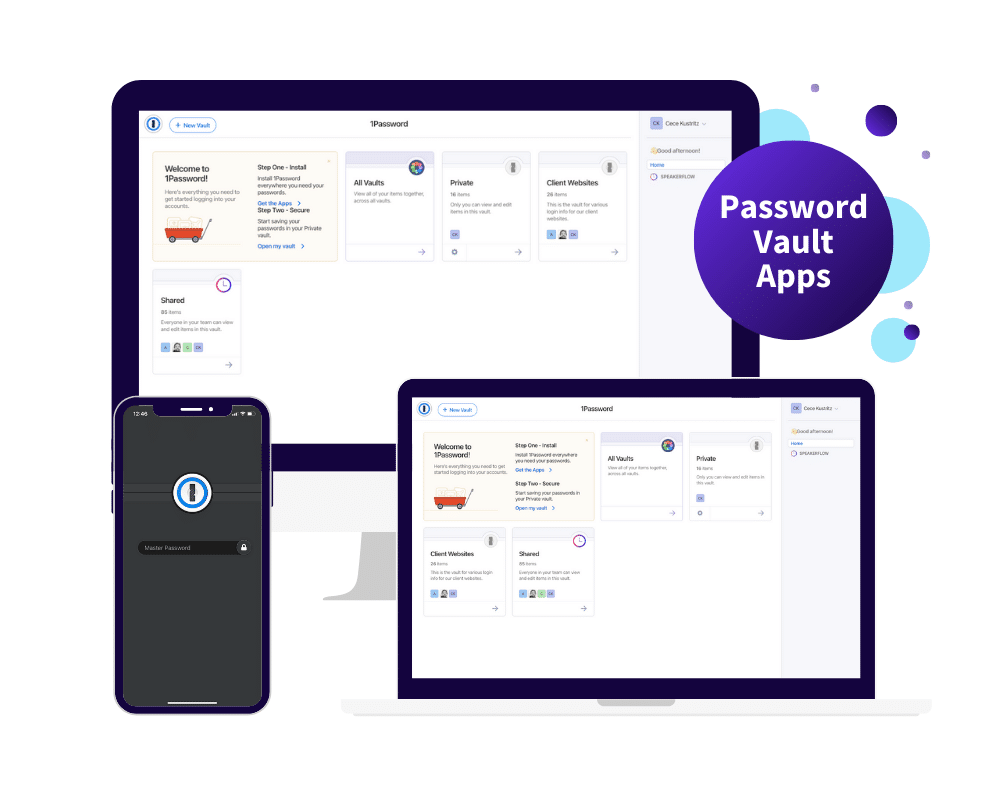
Launched in 2005, 1Password is the most-frequently recommended password vault app among our clients. With multiple variations, the 1Password app allows you to create, record, and monitor as many passwords as needed across your other systems. It also comes with app variations for all of your devices. So, whether you’re working from home or on the road, you’ll be able to login to any of your tools effortlessly.
- Security: It notifies you when you’re using a password more than once, if it’s not secure, or if someone has logged in without your permission. You can also set up multiple levels of authentication for added security.
- Mobility: With a mobile app, desktop app, and browser platform, you can access 1Password from anywhere. You can even use them offline!
- Convenience: If you’re like me and terrible at coming up with strong passwords, 1Password comes with a “password generator” to make it simple. It also lets you copy login info from the app or a browser extension – whatever’s more convenient.
- Team Collaboration: A single 1Password account can have multiple users, so you can share passwords as needed with members of your team.
- Price: It starts at $4 per user per month, making it affordable even as your team expands.
[hubspot type=cta portal=5815852 id=4423b6b8-d7d0-4f03-b792-184db7c3284b]
Non-Technical Support For Speakers
Last but not least, technology is only as useful as the strategy and community behind it. Consequently, the last two speaking biz tools we’ll cover aren’t technical but, instead, personal. They’re all about the people around you, supporting you in your efforts to find the best strategies and technology for your business. They’re also two of the reasons we jumped into the speaking industry and continue to be passionate about serving those around us.
Speaker Coaching
The first non-technical speaking biz “tool” is coaching and consulting specific to professional speakers. Across the speaking industry, these programs come in many shapes and sizes. Some are short-term programs, designed to help you pinpoint areas of your business that need work. Others are meant for the long haul, so you can improve your business with a helping hand along the way.
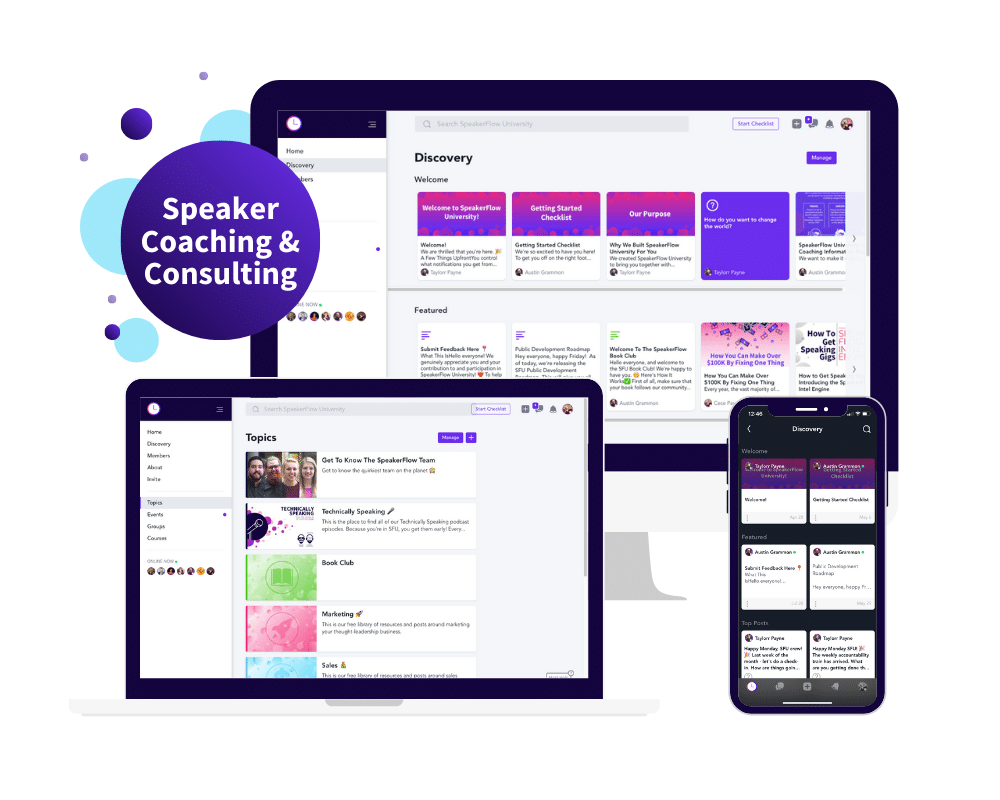
However, in recent years, we’ve identified two pain points that remained for speakers seeking coaching: insight from other speakers and affordability.
With that in mind, as you consider the range of coaching programs available, keep in mind what you need most. What is your budget for a speaking coach? Would you prefer individual or group coaching? Are you looking for a short or long-term coach? Outline where your needs fall for each of these questions, and compile your “ideals” for a speaker coach.
From there, weigh your options based on the programs that fit your criteria. Below are some of the most commonly chosen programs currently on the market, to get you started.
- SpeakersU: Owned and operated by speaker James Taylor, coaching includes focus on speaker sales and marketing as well as stagecraft, ideal for new speaking businesses looking to grow
- The Speaker Lab: Owned and operated by speaker Grant Baldwin, coaching is conducted in small groups and focused on getting started as a speaker
- Wealthy Speaker School: Run by former speaker agent Jane Atkinson, coaching conducted all online and is designed for new or aspiring speakers
Speaker Launcher: Also run by Jane Atkinson, more exclusive (and expensive) coaching for established speaking businesses looking to expand, emphasizes sales coaching
Speaker Associations
The second non-technical speaking biz “tool” is speaker associations. Similarly to speaker coaching, associations are generally location-specific organizations in which professional speakers can connect and learn from each other. In addition to local events, many also participate in national or international gatherings. This allows their members to connect with speakers from around the world and compare industry findings.
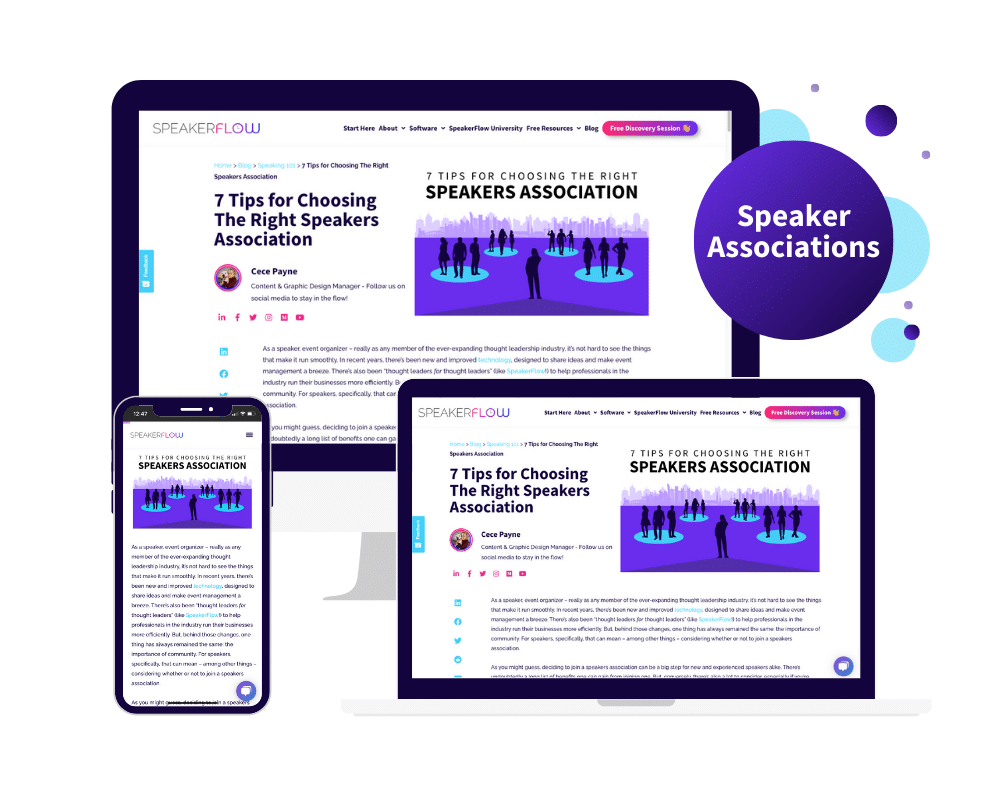
Currently, there are a handful of speaker associations that stand out worldwide. In the U.S., for example, there’s the National Speakers Association (NSA), which hosts smaller chapters across U.S. states. In Canada, there’s the Canadian Association of Professional Speakers (CAPS), and in the UK and Ireland, there’s the Professional Speaking Association (PSA).
Additionally, all of these associations are members of the Global Speakers Federation (GSF). Like the aforementioned groups, the GSF’s goal is providing industry education, resources, and news for speakers. However, rather than a local or national focus, it’s focus is international, so all of their member associations can share their unique insights.
Depending on your location and the size of your business, one or more of these associations may be beneficial.
If you’re not yet a member of a speakers association, for more information, see our previous guide to narrowing down which association(s) is right for you.
Conclusion
Although this list is by no means exhaustive, hopefully, it provides you with a starting point for integrating technology and community in your speaking business.
For more information about mastering the business of speaking, check out our podcast or our resource library. In addition to our blog, we update both of these resources regularly, so you know you’re getting up-to-date content.
Alternatively, for strategy and advice specific to your business, drop us a line! As I mentioned above, we’re passionate about making new connections. So, if we haven’t met you yet, we’re already excited to do so. Hopefully, see you soon! 😊
